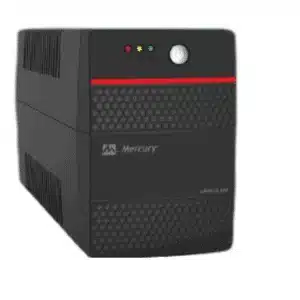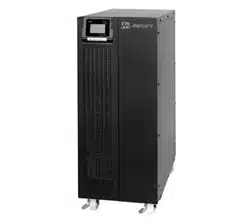Uninterruptible Power Supply
An uninterruptible power supply (UPS), also known as a battery backup, provides backup power when your regular power source fails or voltage drops to an unacceptable level. A UPS allows for the safe, orderly shutdown of a computer and connected equipment. The size and design of a UPS determine how long it will supply power.
UPS Types
There are two types of UPS: Line Interactive and Online UPS System. The Line Interactive UPS monitors the power line and switches to battery power as soon as it detects a problem, while an Online UPS always has the battery engaged, even when the power is functioning correctly.
Line Interactive UPS

The Line Interactive UPS monitors the power line and switches to battery power as soon as it detects a problem. The switch time can be as long as 25 milliseconds depending on the amount of time it takes the UPS to detect the lost utility voltage. Learn more about Line Interactive UPS on Mercury Direct.
Online UPS System

The Online UPS is ideal for environments where electrical isolation is necessary or for equipment that is very sensitive to power fluctuations. Since it draws current from the battery at all times, there are no time lags in the switchover to the battery. Learn more about Online UPS on Mercury Direct.
UPS Components
A UPS is typically composed of a rectifier, an inverter, and a battery or flywheel backup. The rectifier converts the input AC power into DC power and can charge the backup battery. The inverter converts the DC power from the rectifier or the backup battery into AC power. Learn more about UPS components on Mercury Direct.
Applications of UPS
Uninterruptible Power Supply (UPS) systems are integral to a wide array of settings, offering crucial protection against power disruptions that could lead to equipment damage, data loss, or even personal injury. Here are some key applications of Uninterruptible Power Supply systems:
- Computers: Uninterruptible Power Supply systems are frequently used to safeguard computers from power disruptions. In the event of a power outage, an Uninterruptible Power Supply can provide sufficient backup power to allow for the safe shutdown of the computer, preventing data loss or hardware damage.
- Data Centers: In data centers, Uninterruptible Power Supply systems are essential for maintaining continuous operation. They ensure that servers and other critical equipment remain operational during power disruptions, preventing data loss and minimizing downtime.
- Telecommunication Equipment: Telecommunication networks heavily rely on Uninterruptible Power Supply systems to ensure uninterrupted service. A power disruption in this sector could lead to communication breakdowns, impacting both businesses and individuals.
- Medical Equipment: In healthcare settings, Uninterruptible Power Supply systems are used to protect life-supporting equipment such as ventilators and monitors. A power disruption in these scenarios could have severe consequences, including potential risk to patients' lives.
- Industrial Equipment: In industrial environments, Uninterruptible Power Supply systems can protect machinery and other electrical equipment from power disruptions, preventing potential damage to the equipment and ensuring the safety of workers.
- Security Systems: Uninterruptible Power Supply systems are also used to ensure the continuous operation of security systems, including surveillance cameras and alarm systems. This ensures that security is not compromised during a power outage.
Understanding these applications underscores the importance of Uninterruptible Power Supply systems in various sectors. They not only protect valuable equipment but also ensure the safety and continuity of critical services. To learn more about the applications of Uninterruptible Power Supply systems, visit Mercury Direct.
UPS and Power Problems
UPS units can be used to guard against a number of power problems:
- Power failure: defined as zero voltage for longer than two cycles.
- Power sag: defined as a reduction in voltage for a short time.
- Power surge: defined as an increase in voltage for a short time.
For more detailed information about power problems and how UPS units can help, you can visit Wikipedia.

